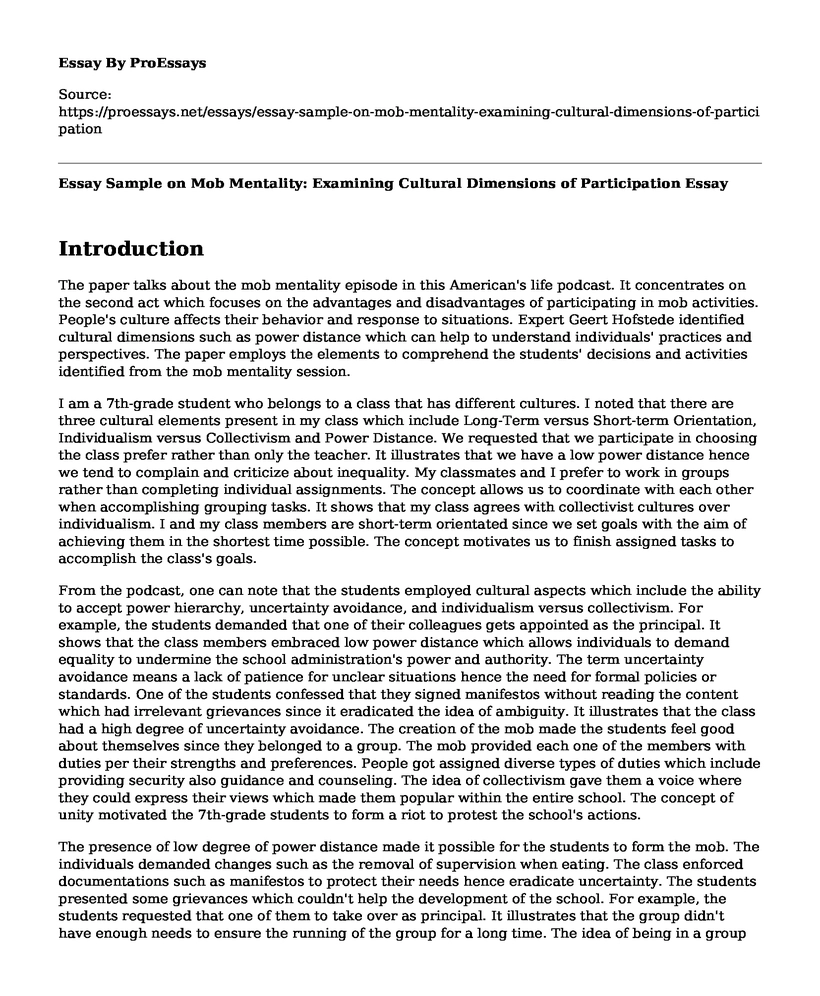Introduction
The paper talks about the mob mentality episode in this American's life podcast. It concentrates on the second act which focuses on the advantages and disadvantages of participating in mob activities. People's culture affects their behavior and response to situations. Expert Geert Hofstede identified cultural dimensions such as power distance which can help to understand individuals' practices and perspectives. The paper employs the elements to comprehend the students' decisions and activities identified from the mob mentality session.
I am a 7th-grade student who belongs to a class that has different cultures. I noted that there are three cultural elements present in my class which include Long-Term versus Short-term Orientation, Individualism versus Collectivism and Power Distance. We requested that we participate in choosing the class prefer rather than only the teacher. It illustrates that we have a low power distance hence we tend to complain and criticize about inequality. My classmates and I prefer to work in groups rather than completing individual assignments. The concept allows us to coordinate with each other when accomplishing grouping tasks. It shows that my class agrees with collectivist cultures over individualism. I and my class members are short-term orientated since we set goals with the aim of achieving them in the shortest time possible. The concept motivates us to finish assigned tasks to accomplish the class's goals.
From the podcast, one can note that the students employed cultural aspects which include the ability to accept power hierarchy, uncertainty avoidance, and individualism versus collectivism. For example, the students demanded that one of their colleagues gets appointed as the principal. It shows that the class members embraced low power distance which allows individuals to demand equality to undermine the school administration's power and authority. The term uncertainty avoidance means a lack of patience for unclear situations hence the need for formal policies or standards. One of the students confessed that they signed manifestos without reading the content which had irrelevant grievances since it eradicated the idea of ambiguity. It illustrates that the class had a high degree of uncertainty avoidance. The creation of the mob made the students feel good about themselves since they belonged to a group. The mob provided each one of the members with duties per their strengths and preferences. People got assigned diverse types of duties which include providing security also guidance and counseling. The idea of collectivism gave them a voice where they could express their views which made them popular within the entire school. The concept of unity motivated the 7th-grade students to form a riot to protest the school's actions.
The presence of low degree of power distance made it possible for the students to form the mob. The individuals demanded changes such as the removal of supervision when eating. The class enforced documentations such as manifestos to protect their needs hence eradicate uncertainty. The students presented some grievances which couldn't help the development of the school. For example, the students requested that one of them to take over as principal. It illustrates that the group didn't have enough needs to ensure the running of the group for a long time. The idea of being in a group made them more confident during the protesting period. For example, the individuals tried to start a riot at the principal's office. The idea of unity motivated the most disciplined and focused students to join the mob. It shows that the element of collectivism facilitated the success of the simulation.
For a team to be strong, the members must have common goals, perspectives, and fantasies. In the podcast, the mob used concepts such as symbolic convergence and fantasy to grow strong. The idea of symbolic convergence means that the members should have the same feelings and goals. For instance, the idea of being in a group made the students feel wanted and appreciated. It illustrates that the common needs and perspectives allowed the team to work together and become cohesive. The class members had the vision of making changes that will help the development of the school. It motivated them to take part in the riot against the principal. The individuals had the fantasy of being productive to become popular within the school facility.
Conclusion
In conclusion, cultural elements have an impact on people's choices and activities. In my class, there is a short-term orientation which isn't present in the podcast. In my class, we don't fear uncertain situations, unlike the 7th-grade Shepaug Middle School students. The cultural dimensions present in the 7th-grade class facilitated the progress and failures of the mob mentioned in the podcast.
Cite this page
Essay Sample on Mob Mentality: Examining Cultural Dimensions of Participation. (2023, Jan 29). Retrieved from https://proessays.net/essays/essay-sample-on-mob-mentality-examining-cultural-dimensions-of-participation
If you are the original author of this essay and no longer wish to have it published on the ProEssays website, please click below to request its removal:
- Deconstructing Gender Essay Example
- Essay Sample on Race: Social Construct or Observed Reality?
- A Letter for Best Friend Paper Example
- Cuba to America: Joel Ruiz's Racial Awakening - Essay Sample
- Fatigue: Physical & Mental Weariness Causes & Impact - Research Paper
- Article Analysis Essay on Single Mother Parenting and Adolescent Psychopathology
- Paper on School-Aged Children's Emotional and Physical Needs: Safety, Security, and Care







